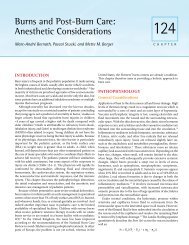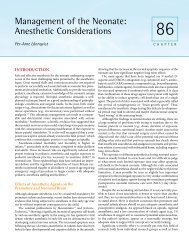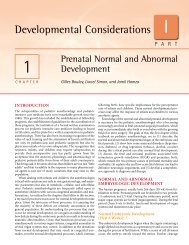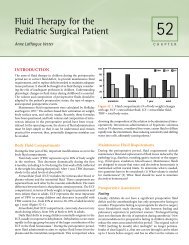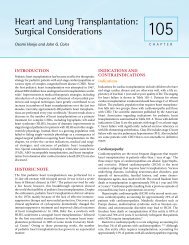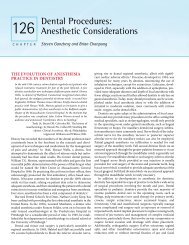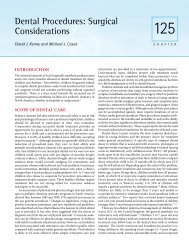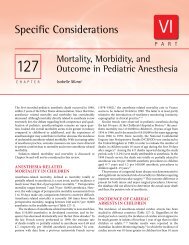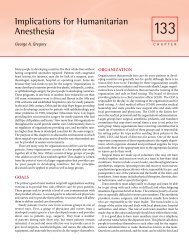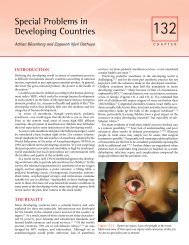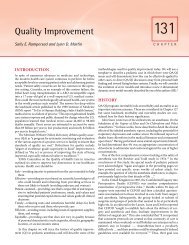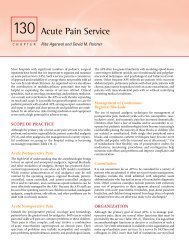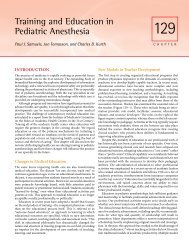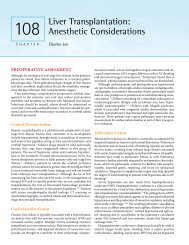Chapter 128
Create successful ePaper yourself
Turn your PDF publications into a flip-book with our unique Google optimized e-Paper software.
2112 PART 6 ■ Specific Considerations<br />
also established the precedent that, in some situations, parents can<br />
legally refuse consent to treatment of their child. In one case, a<br />
mother refused chemotherapy for her 3-year-old child who was<br />
suffering from cancer. The hospital took the mother to court. The<br />
court upheld the mother’s decision, because the judges felt there<br />
was only a small chance of recovery and also because of the severe<br />
side effects that would result from chemotherapy. 24 Thus, it is<br />
impossible to set hard and fast rules. Each case should be analyzed<br />
on its own merits. What is clear is that if treatment is immediately<br />
necessary to preserve life, doctors should proceed with treatment.<br />
If treatment is not immediately required, then referral to a court<br />
of law should be undertaken. Doctors can only act in defiance of<br />
parental views in the emergency situation.<br />
Nontherapeutic Circumcision<br />
An issue directly applicable to anesthesiologists is that of nontherapeutic<br />
circumcision. Female circumcision, which involves<br />
suffering, mutilation, and serious health risks, is illegal under U.K.<br />
law 25 and will not be discussed further. The issues surrounding<br />
male circumcision, on the other hand, are less clear and require<br />
further analysis. In children, this virtually always relies on parental<br />
consent and is usually carried out for ritual, social, or cultural<br />
reasons. Brazier has commented that male circumcision is a matter<br />
of medical debate and for Jewish and Muslim parents it is an article<br />
of faith. She argues that the child suffers momentary pain and,<br />
although medical opinion may not necessarily regard circumcision<br />
as positively beneficial, it is in no way medically harmful if<br />
properly performed. The community as a whole, she claims,<br />
regards it as a decision for the infant’s parents. 26<br />
These arguments can be challenged. Firstly, there is extensive<br />
literature on the harms of circumcision. 27,28 It is also not clear from<br />
her argument how the operation can be justified legally and<br />
ethically. If the principal starting points are that everyone has a<br />
right to bodily integrity and that proxy consent has to be used<br />
reasonably and in the interests of the child, then it is possible that<br />
the procedure cannot be justified. It is also self-evident that any<br />
future choice is limited once the procedure is undertaken.<br />
The ethical justification for circumcision is that it is in the<br />
child’s best interests because it facilitates social acceptance rather<br />
than exclusion and enhances cultural identity and belonging. The<br />
degree of social acceptance or exclusion inferred is variable, and<br />
this should be considered when weighing up what is in the boy’s<br />
best interest: the child in an orthodox Jewish or Muslim culture<br />
has a very different perspective from one whose parents wish him<br />
to be circumcised simply to be like his father. Parental preference<br />
alone would not pass the “best interests” test. On a practical level,<br />
there is an argument that denying access to medical circumcision<br />
will result in greater harm by encouraging illegal circumcision in<br />
an unhygienic environment by unskilled practitioners. This is a<br />
weak argument, however, as it can also be used to justify very<br />
harmful practices, such as female genital mutilation and ritual<br />
sacrifice, which should be prevented by law rather than by the<br />
permission of a lesser evil.<br />
As previously argued, it is clear that parental rights are derived<br />
from parental duty and exist only so long as they are needed for<br />
the protection of the person and property of the child. Giving<br />
consent to medical treatment of a child is a clear example of<br />
parental responsibility arising from the duty to protect the child. 29<br />
The rights reside in the child with the parents acting as agents for<br />
the child to enforce those rights. 30 Even the argument utilized later<br />
in nontherapeutic research, that it may be acceptable as long as it<br />
is not against the interests of the child, fails because of the potential<br />
harms caused.<br />
In Australia, the Queensland Law Reform Commission stated:<br />
“Unless there are immediate health benefits to a particular child<br />
from circumcision, it is unlikely that the procedure itself could be<br />
considered therapeutic … The circumcision is invasive, irreversible<br />
and major. It involves the removal of an otherwise healthy organ<br />
part. It has serious attendant risks … On a strict interpretation of<br />
the assault provisions of the Queensland Criminal Code, routine<br />
circumcision of a male infant could be regarded as a criminal act.<br />
Further, consent by parents to the procedure being performed may<br />
be invalid in the light of the common law’s restrictions on the ability<br />
of parents to consent to the non-therapeutic treatment of children.”<br />
In the United Kingdom, male nontherapeutic circumcision is<br />
generally assumed to be lawful provided it is performed<br />
competently, there is valid consent, and it is believed to be in the<br />
child’s best interests. Judicial review has shown that this is “an<br />
exercise of joint parental responsibility” and as such both parents<br />
must give consent. 31,32 The term “best interest” encompasses<br />
medical, emotional, and all other welfare issues, and it should be<br />
noted that, at least for incapable adults, it is for a judge, not the<br />
doctor, to finally determine what is in the best interests of the<br />
person concerned. 33<br />
The legal standing on nontherapeutic circumcision may be<br />
affected by the Human Rights Act, which, in 2000, incorporated<br />
Articles of the European Convention on Human Rights 34 into U.K.<br />
Law. Rights that may be relevant are:<br />
●<br />
●<br />
●<br />
●<br />
●<br />
Article 3: “No one shall be subjected to torture or to inhuman or<br />
degrading treatment or punishment.”<br />
Article 5(1): “Everyone has the right to liberty and security of<br />
the person.”<br />
Article 8: “Everyone has the right to respect for his private and<br />
family life” except for the “protection of health or morals, or for<br />
the protection of the rights and freedoms of others.”<br />
Article 9(1): “Everyone has the right to freedom of thought, conscience<br />
and religion.”<br />
Article 9(2): “Freedom to manifest one’s religion or beliefs shall<br />
be subject only to such limitations as are prescribed by law and<br />
are necessary in a democratic society in the interests of public<br />
safety, for the protection of public order, health or morals, or for<br />
the protection of the rights and freedoms of others.”<br />
As yet, the full impact of the Human Rights Act on medical<br />
decision-making is still to be determined. If medical evidence were<br />
conclusive in showing that circumcision is prejudicial to a child’s<br />
health or welfare then it is likely a legal challenge on human rights<br />
grounds would be successful, and indeed that there may be obligations<br />
on the state to proscribe it. 35 As always, legal advice should<br />
be sought if there is any doubt over the legality of proceeding with<br />
treatment.<br />
Finally, those in favor of continuing with this practice need to<br />
answer one further question; why can’t the procedure wait until<br />
the child is old enough to make his own decision?<br />
Parental Presence in the Anesthetic<br />
and Resuscitation Rooms<br />
The issue of parental presence in the anesthetic room and<br />
resuscitation room has also been raised recently. Some argue that



